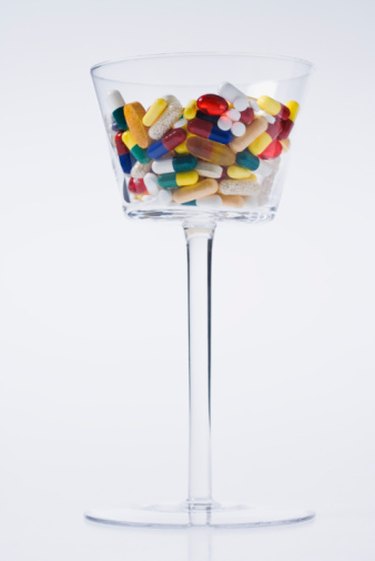
Xanax is a brand name for the medication alprazolam from the benzodiazepine family of drugs. These medications are used to treat anxiety, panic disorders and depression-related anxiety. If you are a coffee-drinker, you are likely aware that caffeine also helps to relieve fatigue and sleepiness and improve focus and concentration. You may have also noticed that caffeine can also cause nervousness and increase anxiety. This can decrease or nullify the effects of Xanax. A study published in the journal "Toxicology in Vitro" indicates that caffeine can adversely interact with benzodiazepine medications. Talk to your doctor and pharmacist before taking Xanax and other medications.
Panic Disorders
Video of the Day
Panic disorders include a range of anxiety conditions. You may have experienced a panic attack, in which symptoms such as a racing heart, shaking, dizziness and breaking out in a cold sweat, occur for no reason. Another type is agoraphobia, a condition that is defined as a fear or anxiety of being in a situation or place which might appear to be difficult or uncomfortable. Some people experience agoraphobia when they are in elevators, traveling in a train or car, driving on a bridge, being in crowded places or even leaving their home.
Video of the Day
Caffeine Effects
Like most people, you likely find coffee and other caffeinated beverages to be stimulating and good for an energy boost. However, even on its own caffeine can cause side effects and should not be consumed in excess. According to the site AddictionInfo.org, it's possible to become dependent on caffeine, and it can cause effects such as a fast or irregular heart rate, nervousness, anxiety, twitching, trembling, insomnia and distracted thoughts and speech. It may also cause diarrhea, nausea and mood swings. Hence, caffeine can increase symptoms of anxiety and panic disorders and may hinder the effects of Xanax.
Caffeine Interactions
A 2009 study published in the medical journal "Toxicology in Vitro" researched the combined effects of Xanax and caffeine on the human body. The study reports that caffeine heightened the toxic effects of this medication causing morphological changes in cells and even cell death in some cases. This occurred because the simultaneous effects of caffeine and Xanax triggered the release of an ezyme called lysosomal protease cathepsin B, causing the break down of cells. Hence, the research advises that it is not safe to mix Xanax with caffeine.
Other Side Effects
Like other prescription medications, Xanax can cause side effects in some cases. Seek urgent medical attention if you experience any sign of an allergic reaction such as skin rash or hives, swelling of the face, mouth, tongue or throat and difficulty breathing. Other serious adverse reactions after taking Xanax include hyperactivity, unusual risk-taking behavior, suicidal thoughts, fainting and light-headedness, seizures, muscle tremors and jaundice or yellowing of the eyes or skin. Less serious side effects include drowsiness, irritability, insomnia, muscle weakness, blurred vision and changes in appetite. Consult your doctor if you experience any side effects after taking Xanax.
- Drugs.com: Xanax
- XanaxXR: Xanax
- Mayo Clinic: Caffeine: How Much is Too Much?
- Psychopharmacology (1990); Separate and Combined Effects of Caffeine and Alprazolam on Motor Activity and Benzodiazepine Receptor Binding In Vivo; Kaplan G. et al; Volume 101(4):539-44.
- Toxicology in Vitro (2009); Caffeine Augments Alprazolam Induced Cytotoxicity in Human Cell Lines; Bishwara . et al; Volume 23: 6; 1100-1109